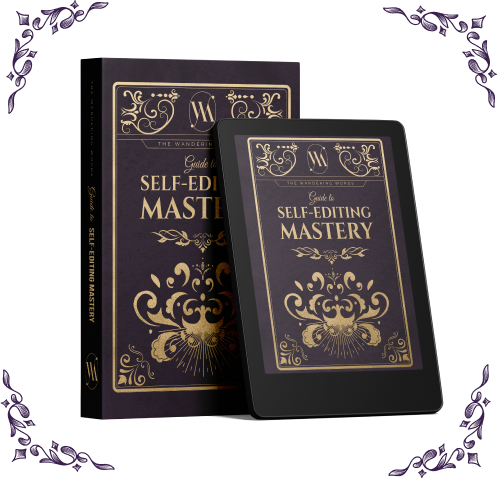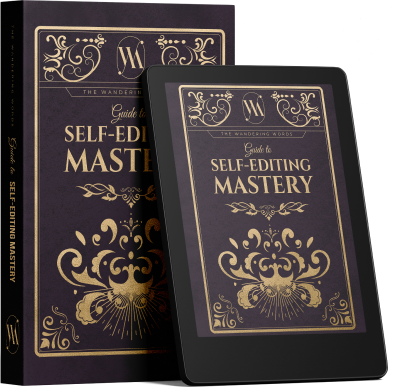Our Guide to Self-Editing Mastery has helped thousands of authors just like you:
- Pre-edit their books with ease
- Avoid the most common writing errors
- Quickly identify spelling & grammar mistakes
- Be more prepared for professional editing
Our Guide to Self-Editing Mastery has helped thousands of authors just like you:


Out of the million-plus words we use to communicate English, two words strike writers with dread: writer's block. If you're reading this article, chances are you are experiencing an impenetrable wall of negativity fortified by a blank page. You may even feel a bit of chafing under the proverbial collar due to a looming deadline as you scour the internet looking for articles on how to overcome writer’s block.
Breathe. Everything will be alright. In this article, you will learn some helpful tips to not only overcome writer's block, but get rid of it once and for all. That’s right, after reading this piece, you will be buzzing with ideas and itching to expand them. However, first things first, to get rid of writer’s block, we need to understand what causes writer’s block.
A lot of times when writers struggle to create, it's because they lack one or more of the following:
The good news is these are all easy issues to fix.
Here are five easy steps to transform your perceptive from a negative, "I've got nothing" into a more positive, "I've got nothing to lose."

Books, magazines, web articles, search results, street signs, subtitles, memes, or—if you want to go the extra mile—Egyptian hieroglyphs. You don't create art in a vacuum. You need fuel to start a fire, and the fuel for stories is more stories! Everything has a story. So, ask yourself, "What is the premise of this story?" Jot your answer down now!
Congratulations, you have an idea—but maybe it's not to your liking. Don't erase it just yet. There are no bad ideas.
I know, I know. I can hear your inner critic protesting, "But my idea sucks so bad Dracula would mistake it for his spawn. There is no fixing it!" Breathe and try this. It's no secret that we are more likely to help our friends with a problem than help ourselves out of one. First, remove yourself from the equation. Imagine that it's not your idea, just an idea. Pretend a friend came up with the idea and asked you, "Can you help me make this better?" Then, deliver your wise advice to said friend. Help that friend help you, and remember, ideas are flexible. They are meant to be molded, stretched, adjusted, and morphed into something interesting. Make your inner critic a critical thinker.
Is your inner critic now trying to convince you that everything you have come up with is dull, boring, cliché? Are you staring at a closet full of been-there-done-that T-shirts?
Don't hit backspace, because I have another secret for you.
Yes, everything you thought of has been done before—but you haven't done everything, and that's what matters. What makes a piece of art original isn't necessarily what appears but how the artist presents it. A fine example would be this article. There are hundreds, if not thousands, of articles on writer's block. However, mine is distinct from those other articles because it came from me. Outside of plagiarism, you won't see another one like it.
Besides, people aren't looking for something completely alien. People are looking for a different facet to an idea they already understand. They want to hear your voice with your point of view because it is unique to you. So share yourself through the written word with the understanding that every lens brings a new perspective.
The idea is present and accounted for. Your butt is in the chair. You have cracked your knuckles. That crick in your neck is out. It is time to do the work, but—ugh! When did writing turn into work? When did it stop being fun? The answer to both of those questions is “never.”
One sure way to beat writer’s block is to treat writing like it is the fun activity you participated in when you first decided to pick up the pen. The days before grammar rules, critics, or success as a professional even crossed your mind. You see, writing has always been fun; you simply forgot what made it fun for you, because you are an adult and now have responsibilities to tend to, promises to keep, and other worries that involve balancing the world on your shoulders.
Breathe. The memories are still there, and together, we will take a trip down a familiar lane.
Do you remember playing pretend as a child? I do; my friends and I would make up characters, pretend we were them, and spend the whole day creating a story around those fictional lives. Do you remember sharing your two cents with your inner circle as a teen? I didn't even have two cents to my name, but we all had opinions about everything from the clothes on our backs, to the movie we just saw, to what we thought of so-and-so's new significant other. Do you remember the debates you had with your parents? They were like war campaigns, complete with hard-hitting facts. The imaginative little girl, the opinionated teen, and the serious young adult are still all a part of who I am today, just as your past is still a part of you.
We don't lose ourselves, but we are prone to forgetting what made us who we are today. Bring some of that imagination, some of that opinion, and some of that passion for the truth into the present. Write like you're the child pretending with their playmates. Voice your opinion as if you were explaining to your high school buddies what should be hip. Tell the truth with the same zeal you showed your parents back when you thought they were unaware of reality.
Play pretend as you write. Have fun.

Congratulations! If you have made it this far, you have your first draft on the page. Yes, the sentences are choppy and the paragraphs are clunky. Yes, there are misspellings, missing punctuation, and, if you're anything like me, too many commas. You may even want to hit the backspace button, burn through your eraser, or make the page bleed with red ink. Don't—not yet. Hold off on the urge to kill your darling, because I have one more tip to give.
Rough drafts aren't meant to be pretty.
Resist the urge to undo all the work you just did. Instead, pat yourself on the back, give yourself a treat, and take at least a half hour to relish all those words you just wrote. This “ugly writing” step is essential—the pretty stuff comes out in editing, and you can't edit what you don't have. The second, third, and fourth edits can come later. Now is the time to feel safe and secure in the knowledge that out of the million-plus words used to communicate English, there no longer exists a single word that gives you dread as a writer. Congratulations, you have overcome writer’s block.

